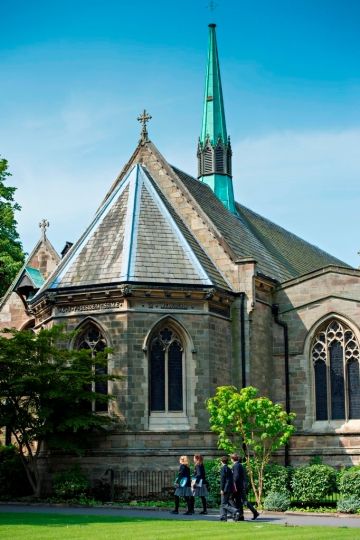Carillon Notes for October 2021
Friday, October, 1st, 2021 Carillon Tune

The chapel of the Repton School, Derbyshire, England.
The hymn tune that is now called Repton was originally written by the English composer Sir Charles Hubert Hastings Parry in 1888 as a contralto aria for Queen Meshullemeth in his oratorio Judith. An oratorio is much like an opera, only it is generally performed as a concert piece, i.e., without staging or costumes. Most oratorios are on sacred or mythological subjects; the most famous oratorio is probably Handel’s Messiah. In Judith, a group of children asks the queen to tell them the story of the Exodus. She laments that she is not sure that God is the god of Israel anymore but consents to tell them the story anyway. The first stanza of her “ballad” is:
Long since in Egypt’s plenteous land
Our fathers were oppressed;
But God, whose chosen folk they were,
Smote those who long enslaved them there,
And all their woes redressed.
In 1924, George Gilbert Stocks, the organist and choirmaster of the Repton School in Derbyshire, England, who had studied under Parry at Oxford, set a text by John Greenleaf Whittier, the American poet, to this melody. Stocks chose five of the last six stanzas of his 1872 poem The Brewing of Soma, beginning with the words “Dear Lord and Father of mankind.” The hymn tune is named after the school. While this is a Christian hymn, the poem from which it is taken, while filled with Christian imagery, is considerably more complex in its spiritual roots.
While the ending stanzas are more peaceful and introspective, the full poem The Brewing of Soma is about an ancient Vedic tradition and begins with a quote from the Rig-Veda; Soma is a Sanskrit word with multiple meanings including “to extract” often in ritual context, and our Hindu Spiritual Advisor Preeta Banerjee says that she learned it as meaning “Ambrosia” much like the same term used in Greco-Roman mythology for the nectar of the gods. Soma is also the name of a god in Hindu mythology that is a personification of this life-giving drink. There has been much debate about what the composition of this drink is, probably since different traditions have interpreted it differently.
Soma is said to possess uplifting and energizing qualities, though in a ritual context it may also contain a mind-altering or hallucinogenic substance like the mixture of milk and hashish used in some celebrations of Shiv. At one point Whittier describes the ceremony as “sacred madness” and “a storm of drunken joy” but these words have more negative connotation now than they probably did in his day. It is also difficult to find adequate language to describe any kind of spiritual ecstasy. The text of the hymn follows, but for those interested, the full text of the poem may be found at here.
Dear Lord and Father of mankind (John Greenleaf Whittier)
Dear Lord and Father of mankind,
Forgive our foolish ways!
Reclothe us in our rightful mind,
In purer lives Thy service find,
In deeper reverence, praise.
In simple trust like theirs who heard
Beside the Syrian sea
The gracious calling of the Lord,
Let us, like them, without a word
Rise up and follow Thee.
O Sabbath rest by Galilee!
O calm of hills above,
Where Jesus knelt to share with Thee
The silence of eternity
Interpreted by love!
Drop Thy still dews of quietness,
Till all our strivings cease;
Take from our souls the strain and stress,
And let our ordered lives confess
The beauty of Thy peace.
Breathe through the heats of our desire
Thy coolness and Thy balm;
Let sense be dumb, let flesh retire;
Speak through the earthquake, wind, and fire,
O still, small voice of calm.
Bob Chilcott, an English singer, conductor, and composer arranged a special anthem version of the tune for Repton’s 450th anniversary celebrations in 2007. The picture that accompanies these notes is of the chapel of the Repton School at an angle that makes it look quite a bit like Goddard Chapel here at Tufts except that Goddard is built in a more Romanesque style (thicker walls, smaller windows) and Repton’s chapel is Gothic (thinner walls, more delicate stonework, and large stained glass windows).
The text is also sung to the tune Rest (or Elton) written in 1887 by Frederick C. Maker, another English composer. It is often favored for congregational singing, especially in America, because it is somewhat simpler. It can be heard below along with the hymn sung to Repton and the aria from which that tune is taken. I have chosen this tune because I think it is beautiful, and because I think that its reverent message of the importance of quiet and calm is always appropriate for people of any faith or philosophy to keep in mind.
With my thanks to Dr. Preeta Banerjee for her help in finding resources on Soma and its associated traditions.
— Thomas B. Dawkins, music director and organist
Listening Links:
“Dear Lord and Father of Mankind” (Repton tune), sung by the choir of King’s College, Cambridge, led by Stephen Cleobury: https://www.youtube.com/watch?v=Rcs7seRM5hU
“Dear Lord and Father of Mankind” (Rest tune), sung by the Dallas Christian Adult Concert Choir: https://www.youtube.com/watch?v=gTFcsckabFs
“Long since in Egypt’s plenteous land” from the oratorio Judith by Charles Hubert Hasting Parry, sung by mezzo-soprano Kathryn Rudge and the London Mozart Players led by William Vann. https://youtu.be/Khzj7TO9q0s